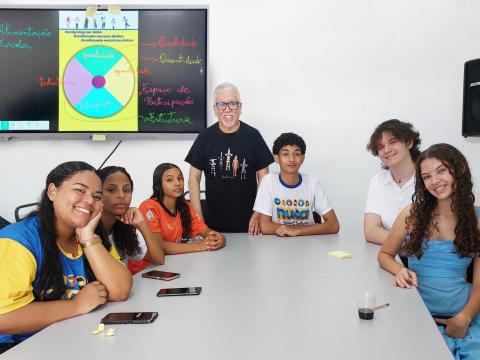Child-led research as a vehicle for social justice

During my time at UNGA-related meetings in New York, Emmanuela -child delegate supported by World Vision- emphasised the vital role of school meal programmes in nourishing children in her community. Similarly, at the G20 side events in Rio de Janeiro, Havenna and Ryan -also child delegates- voices comparable thoughts. They proposed to conduct a child-led research project to explore students’ perceptions and experiences on school meals and how their recommendations could inform meaningful change.
After some months, this idea took form and became a vibrant project that engages 150 child researchers -ages 12 to 17- from 14 countries, including Brazil, Cambodia, the Dominican Republic, Ghana, Guatemala, Indonesia, Lebanon, Malawi, Peru, Rwanda, Sierra Leone, Sri Lanka, Zambia, and Zimbabwe.
A few weeks ago, I travelled to Brazil to support the child researchers in their journey in the cities of Manaus and Fortaleza. I was genuinely impressed -but not surprised- by their eagerness to express their ideas, experiences, and aspirations regarding school meals, as these programmes immensely impact their daily lives at schools. They told me that they do not want to be passive beneficiaries of this kind of service; on the contrary, they want to ensure that their perspectives are taken into account in order to shape the design and implementation of these programmes and related policies.
If you are wondering what school meals are and what I mean by child-led research, these may be unfamiliar terms. School meals—also called school feeding—are programmes that provide food for children during the school day to alleviate hunger, help increase student attention and learning, and boost school attendance.
For many children supported by World Vision, school meals are a critical lifeline. Living in poverty and often facing harsh conditions, the food they receive at school may be their only meal of the day. That’s why they are eager to be heard, especially in the lead-up to the 2025 Global School Meals Summit, hosted by the government of Brazil in September.
Regarding child-led research, this is a participatory process where children, either with or without the support of adult facilitators, conduct pieces of research by selecting the topic, designing the tools, collecting and analysing information and providing recommendations. This method recognises the unique insights that children can contribute to the research process based on their own experiences and their understanding of their peers' lives. In fact, this approach has been counted as a high participation standard in childhood literature. Furthermore, our own practice at World Vision has shown that children are capable of conducting research and generating evidence on issues relevant to them.
Whilst attending workshops with the Brazilian children, they told me they hope their research findings will spotlight critical issues—such as the quality, quantity, and accessibility of school meals. When I asked why they chose child-led research, they cited powerful local examples. For instance, they said that a few years ago, a group of children in Fortaleza conducted a research project on discrimination-based violence in their communities in order to inform public debate about this hidden topic. Notably, Carlos, a former child researcher from that project, is now a youth facilitator supporting the current initiative.
My visit to Brazil enlightened me with fresh insights and reaffirmed my belief in the transformative power of child-led research as a vehicle for social justice. One important lesson is not to assume that all adults are supportive of child voice and empowerment, and they sometimes discourage children from taking part in these initiatives. Children shared that even when they gather strong evidence, some adults do not take it seriously, and their research projects are often dismissed or ignored. This reality should not demotivate us. Instead, it should encourage us to continue raising awareness about the value of evidence collected by children and to advocate for spaces where their voices are truly heard.